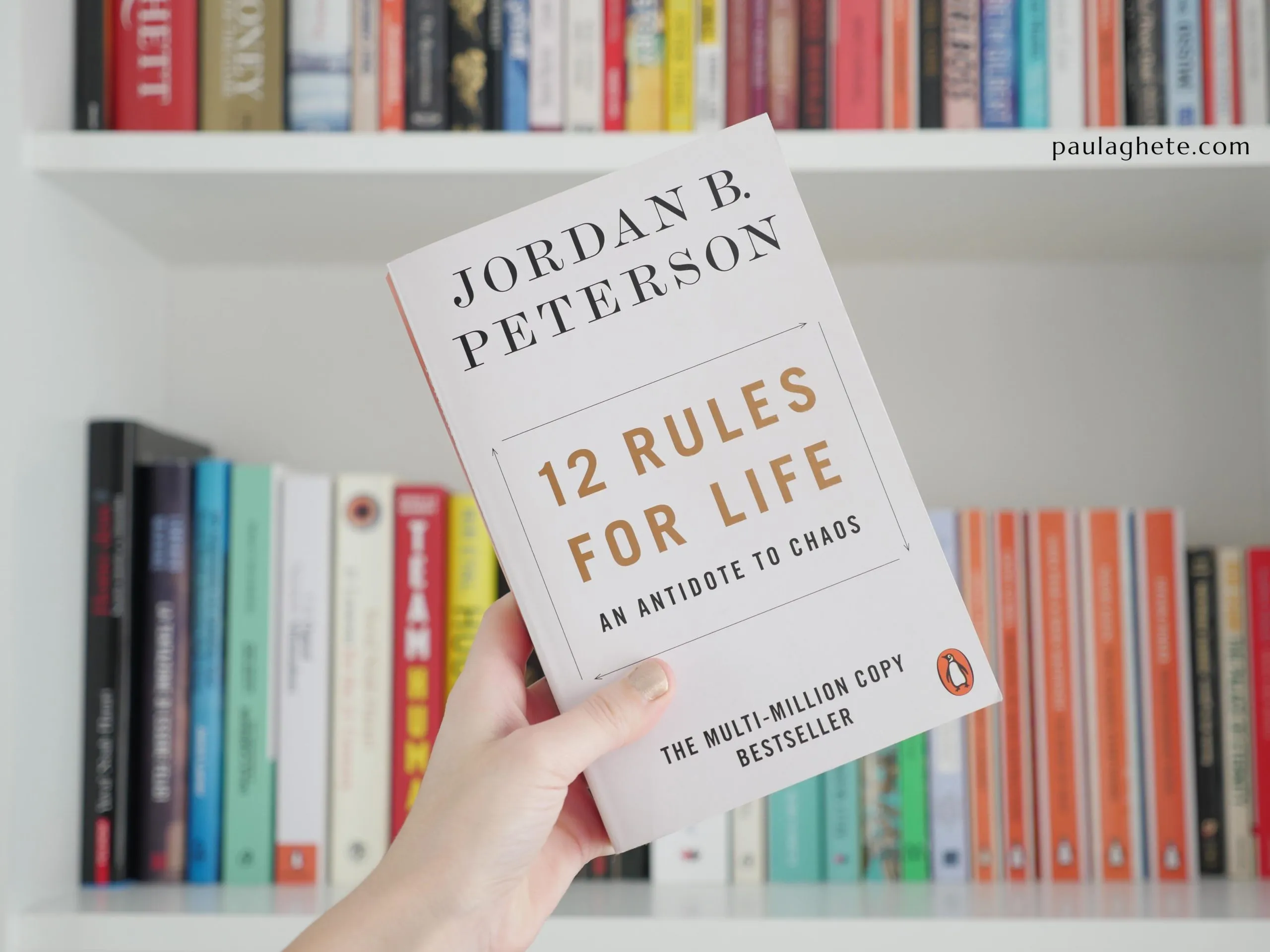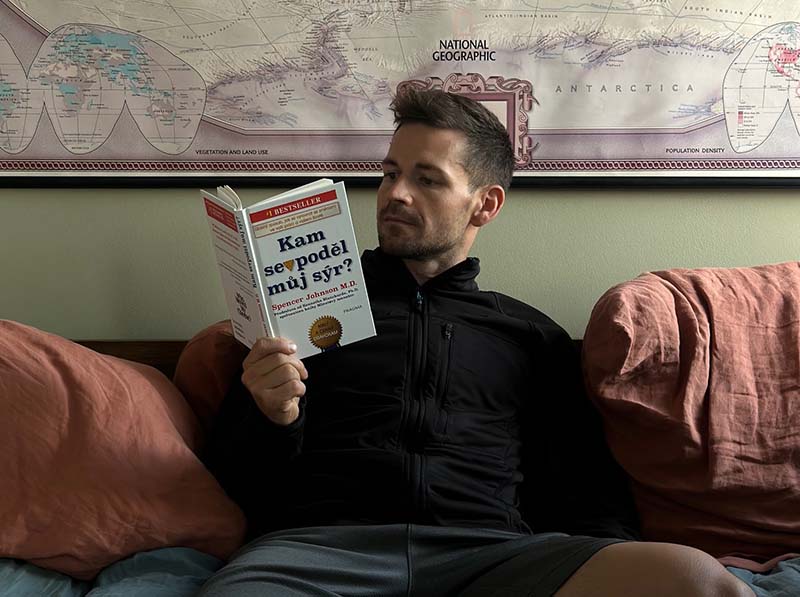How to live a better, more meaningful life. Not necessarily easier. Drawing from psychology, philosophy, religion, and personal anecdotes, Peterson addresses issues such as responsibility, suffering, and the search for meaning. The book encourages readers to confront their personal weaknesses and take responsibility for their life.
Jordan Petterson is Canadian clinical psychologist and professor and somewhat a controversial figure. He has been accused of being a homophobe and many other things. To me, that’s just a shallow labelling of people who are social constructivists that don’t want to take responsibility for their life. If they would dig deeper, they would find out that Peterson is for example supporting gay parenting, saying that the inability to build family is what leaves many people without a deeper sense in life.
One of the modern stoics, Pierre Hadot said: “Just as an athlete gives new form and strength to his body through repeated physical exercises, so a philosopher develops the strength of his soul through philosophical exercises and thus achieves transformation.”
This is the reason, why everyone needs philosophy in their life. To strengthen the mind, because only a strong mind will allow us to overcome obstacles and enjoy the fruits of life.
Epictetus talked about how it is necessary to work not only on physical but also mental development. The Greeks had Kalokagatia, an ideal of the development of body and spirit.
How will it translate into real life?
Peterson wrote a book of rules, not recommendations. I think the reason is we have tons of recommendations, for example from the doctors, but who actually follows them?
The rules are pretty trivial rules. You might be even asking – is that everything? Why it gained so much popularity and was translated into so many languages?
The thing is – though even a three-year-old child knows these rules, not even an 80-year-old person follows them. The rules seem trivial when you read them, if you want to follow them, maybe it won’t be that simple anymore.
Without rules we quickly become slaves to our passions – and there’s nothing freeing about that. The most liberating disciplines such as Zen Buddhism or Stoicism have the strictest rules.
Jocko Willink has the motto that discipline equals freedom.
Nothing can be achieved without discipline and rules and routine. It can be as simple as getting up and going to bed regularly, and exercising.
Without sugarcoating it, Peterson says life is hard. He talks about the reality of life as it really is. But he also says what we can do about it and that we have the ability to do something about it by taking personal responsibility for our life.
The philosophy of the 5 senses.
If it makes sense from the perspective of evolutionary biology, modern neurology, mythology, religion, and folk wisdom. There will probably be something to it. It doesn’t mean it will be completely true, but it’s worth thinking about.
Stoics aimed to develop the knowledge of physis – the nature of things – to know the nature of the universe. Its to get to know your nature as well, taking some personality tests like the Big Five of Mayers Bricks (don’t take it like a dogma, but rather to get a general understanding of some of your traits.)
All social constructivists should read books on evolutionary biology and psychology
Peterson is devoted to the development of character – virtues (a lot of people will be offended) – freedom of opinion does not mean equality of opinion. Opinions are like anus, everyone has one. It is good to examine them, even those with which one does not agree.
It’s a negative philosophy – “you need a philosophy that can withstand tragedy”
Vs. The “secret” philosophy of happiness – positive affirmations – who then meets with some misfortune, then it collapses like a house of cards.
Happiness is only a golden fly” flies only live for a while
We are concerned with Eudaimonia – lasting happiness, contentment of spirit.
Peterson’s philosophy is contradictory (jinyang) – complementary, the symbol rotates, one can turn into the other.
What is important is what happens on the border of opposites – that is, on the border of order and chaos. The power of both is harmful.
Extreme begets extreme.
The philosophy of taking personal responsibility for your life.
Straighten up and close your chest
Don’t slouch from mom, stand up straight. He uses the extreme example of lobsters to show that things we often think of today as social constructs go back millions of years. What effect does our position have on hormonal balance and imbalance (serotonin, feeling of joy, happiness). Posture – important in breathing exercises, meditation, strength training. Man who celebrates a goal vs. A person huddled in a corner. Straightforward person vs. Crooked. Extension is important. Posture affects the psyche, the psyche affects the posture.
Treat yourself as someone you are responsible for.
People take care of cars and pets and forget about themselves. We often do not influence things around, outside. When we help others, what the result will be is not entirely in our power. What is in our power is what we will do with ourselves.
You ask What progress have I made – I have become a friend to myself. (Hecaton)
Start with self-cultivation and self-care. To take responsibility for oneself to be healthier, stronger, better work, better life.
Hierocles Circle –
Peterson – do things that are good for you, your family, your community, and the world. It is not a self-centered philosophy.
Things you do for yourself must be good for others.
In order to be able to help those in need, we ourselves must be stronger physically and mentally.
Make friends with people who want the best for you
Someone decides to start exercising, stop smoking, eat healthy – colleagues at work/family – you’re crazy, you won’t go out for a beer with us today, you won’t have a cigarette anymore, hahaha, you can’t stand it. People are like crabs – if you throw them in a bucket and one of them starts to climb, the others will pull him down. Support is important and often all it takes is a few small words of encouragement. Have friends and family to support you. They will not always tell you what you like, their duty is also to point out the wrong course. To be honest with you.
Eliot’s cocktail party – I hope there’s something wrong with them.
Compare yourself to who you were yesterday, not who someone else is today
It is good to set goals, but as small achievable goals as possible. Look for small continuous improvements. See how the New Year’s resolutions turn out. A small achievable goal and follow the steps. Business plan for 5 years, divided into small small steps. The target is a star on the horizon beyond which the person



